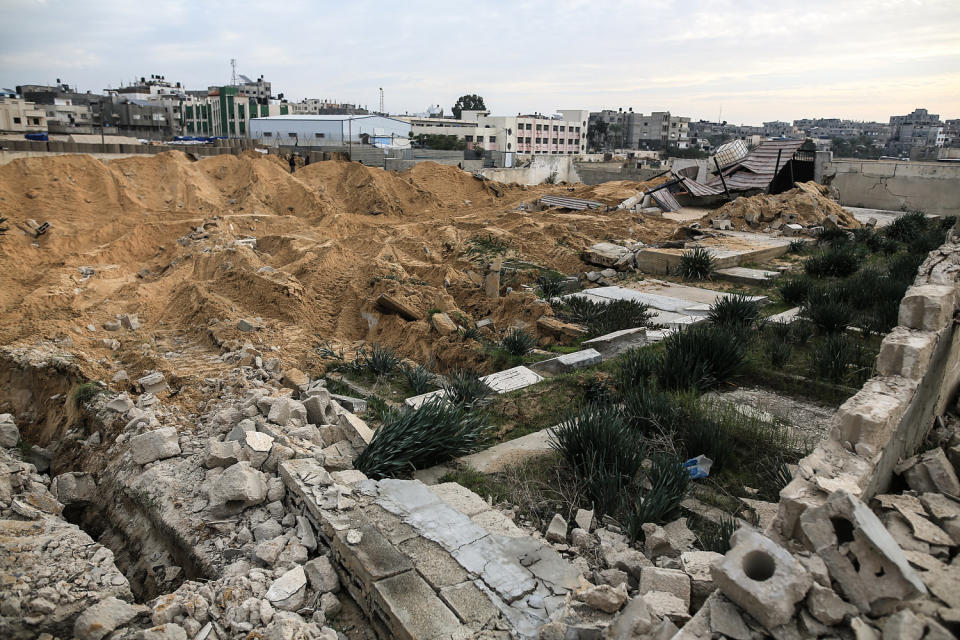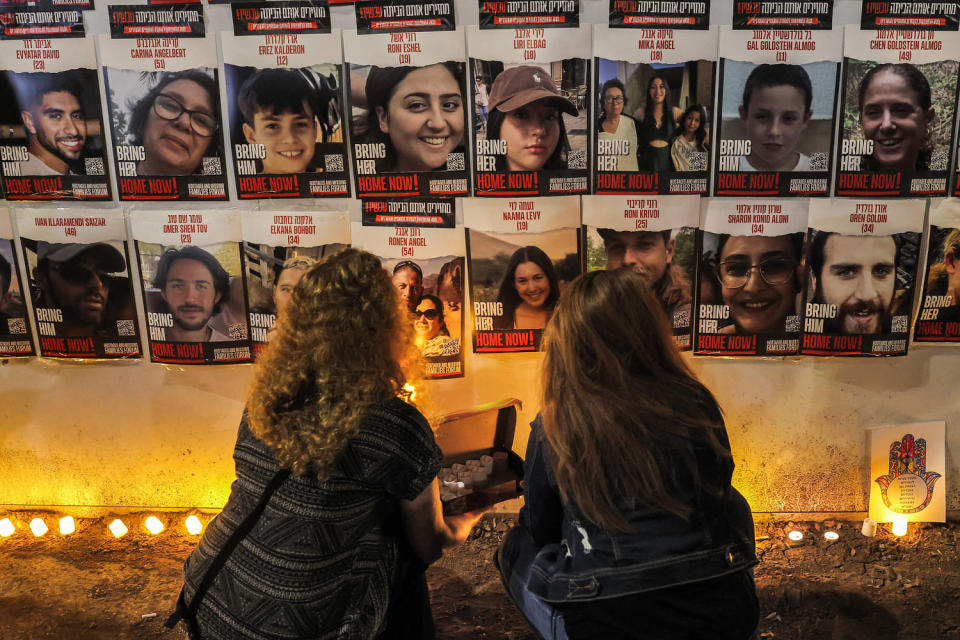Israeli troops severely damaged a cemetery in southern Gaza earlier this week in what the country’s military indicated was part of a search for hostages who were kidnapped by Hamas in its Oct. 7 terror attack.
The cemetery appeared bulldozed-over on Wednesday morning, with tombstones crushed and graves holding human remains exposed in some of the burial plots, according to video shot by an NBC News team and interviews with residents on the scene.
As morning light crept over the southern region of Khan Younis, Gazans who had been sheltering nearby from an intense overnight attack and area residents were visibly distressed at the sight of the old Muslim burial ground.
They said the cemetery was raided by Israeli troops, with an unknown number of corpses taken.
“What did the dead do to them? It is a wasteland — what is in it? What is the sin of the dead whose bodies they take?” Masoud Al Naffar told NBC News at the burial site on Wednesday.
NBC News asked the Israeli military to respond to the claims that its forces had bulldozed the cemetery and taken bodies away.
The Israel Defense Forces responded that it is committed to finding all hostages and returning any bodies still held in Gaza. “The IDF conducts precise hostage rescue operations in the specific locations where information indicates that the bodies of hostages may be located,” it said in a statement on Thursday.
“The hostage identification process, conducted at a secure and alternative location, ensures optimal professional conditions and respect for the deceased. Bodies determined not to be those of hostages are returned with dignity and respect,” the statement added.

The IDF declined a request from NBC News for further comment on whether it had identified any hostages after its operation at the cemetery or whether it had conducted similar searches at other cemeteries throughout the war.
Locals identified the cemetery as the Khan Younis central cemetery, first opened in 1982 and divided into several family plots, as is customary in Islamic burial sites. Several residents told NBC News it is the only cemetery used by families from the city of Khan Younis and the surrounding refugee camps. Since the onset of hostilities, it has been abandoned by workers but they estimated thousands of Palestinians are buried there.
It lies several hundred yards from the Nasser Hospital, where hundreds of Gazans fled in chaotic scenes as Israeli ground troops entered the area overnight Wednesday. Those sheltering there included Al Naffar, who said he had resorted to sleeping on a mattress with his family outside the hospital.
Two eyewitnesses who were sheltering at the hospital filmed the gravesites in the aftermath of the operation on Wednesday morning and posted them to social media. NBC News geolocated their videos to the same cemetery. In interviews with NBC News on Thursday evening, the eyewitnesses described a “terrifying” and “truly bloody night” in which Israeli tanks were first stationed outside the hospital and then proceeded to the cemetery.
“The vehicles advanced at midnight, and the army began launching very violent attacks. There were fire belts, violent clashes and artillery shelling. The bombardment continued until 6 in the morning,” Mohammad Salama, a freelance videographer, said in an audio message from Khan Younis on Thursday night.
“We witnessed with our own eyes in the morning of the following day that the occupation tanks withdrew from the cemeteries. And indeed corpses were stolen from this gravesite,” said Mohammed El Helo, a 23-year-old independent photojournalist who is also sheltering at the hospital.


Videos from the two Gazans that have since been widely shared on social media and verified by NBC News showed cemetery walls destroyed and several close-ups of graves that had been dug up.
Ahmed Shaer, a human rights field researcher based in Gaza who works for the Euro-Med Human Rights Monitor, a rights organization registered in Geneva, said he documented damage done to the cemetery.
“Some graves were exhumed and opened,” he said in a message to NBC News, including a family plot “where the wall was destroyed.”
The IDF statement on Thursday added that “if not for Hamas’ reprehensible decision to take Israeli men, women, children and babies hostages, the need for such searches for our hostages would not exist.”
Hamas did not respond to requests for comment on the events described in this story.
Ramy Abdu, chairman of the Euro-Med Human Rights Monitor, pushed back against the Israeli military’s comments that intelligence justified its operation at the cemetery.
“We believe that this attack, considering previous assaults on cemeteries, indicates that Israel systematically violates the sanctity of the deceased and their graves,” he said in a statement to NBC News.
Since the war’s onset, Euro-Med has been vocal in its assessments of cemetery damage in Gaza.
“While intelligence information might point to specific graves and cemeteries, the observed widespread destruction and excavation appear indiscriminate,” Abdu said. “If the actions were intelligence-driven, why is there extensive destruction in cemeteries, and why hasn’t the army announced the discovery of Israeli hostages, despite over two months of cemetery-targeting operations?”
According to international humanitarian law, warring parties have an obligation to respect cemeteries, and exhumations should not take place unless credible evidence is provided by an armed party with due notice to local authorities.
Even given that it’s a time of war, El Helo said, the Israeli operation violated the sanctity of such a place. He was surprised and couldn’t understand why the burial site sustained such damage.
“A cemetery that has dead poses no danger for the army,” he said. “Maybe they came to this cemetery searching for their hostages. Even if they came to search for their hostages, they shouldn’t have done this destruction.”
This article was originally published on NBCNews.com

David Turner is a globe-trotting journalist who brings a global perspective to our readers. With a commitment to shedding light on international events, he explores complex geopolitical issues, offering a nuanced view of the world’s most pressing challenges.



:max_bytes(150000):strip_icc():focal(956x275:958x277)/prince-harry-service-members-of-the-year-42624-1a874188a0db4f4ea83e4cca395daf35.jpg)




